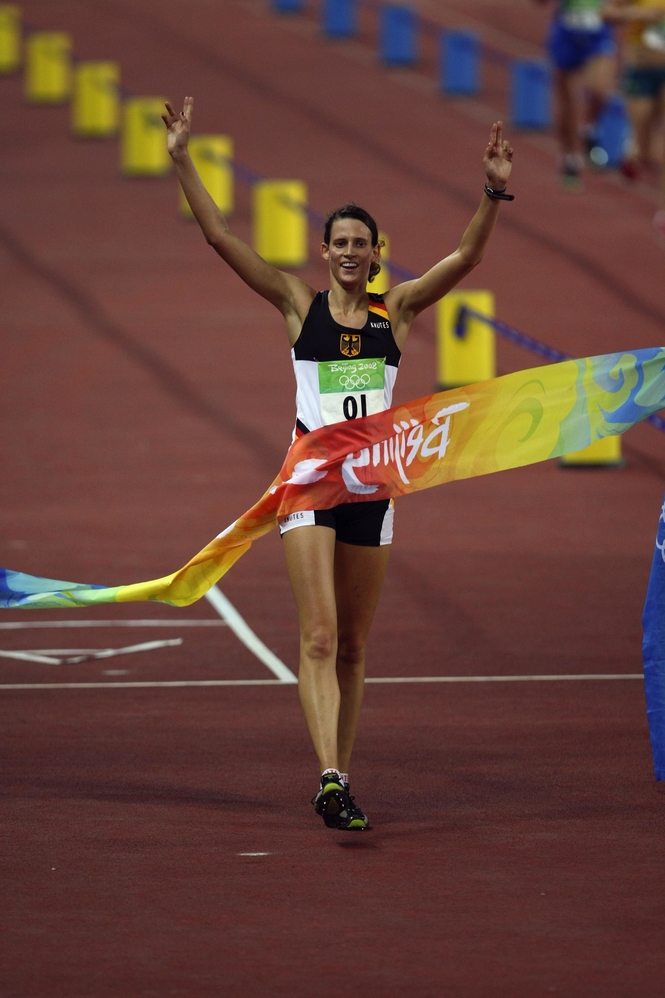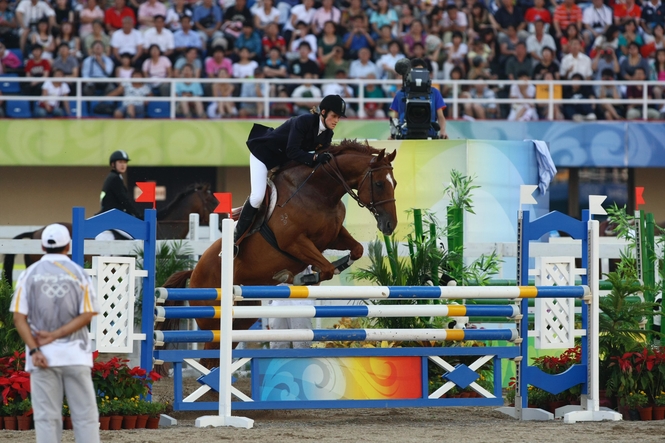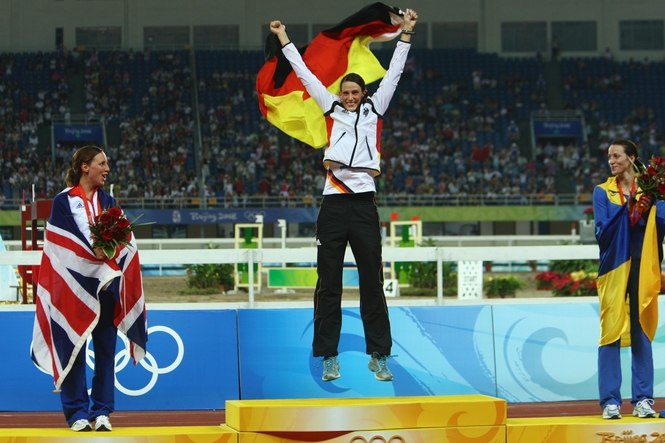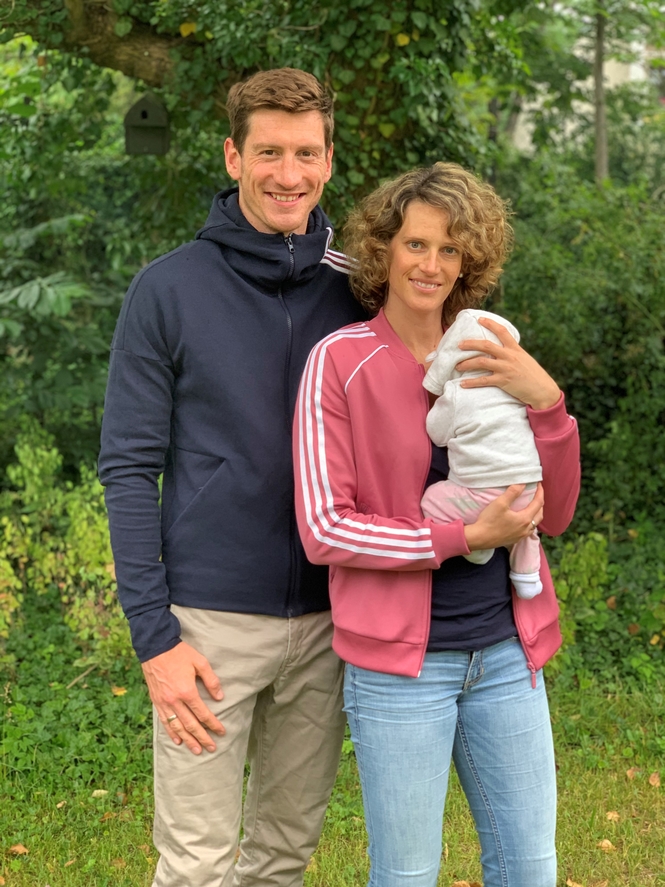Golden memories: Lena Schoeneborn (GER) on the day her star was born at Beijing 2008
In the latter years of her career she was a dominant figure, a mature and uncompromising athlete, a born winner who had straddled the sport of Modern Pentathlon for a decade.
Remembering Lena Schoeneborn at her peak, as the athlete who won eight UIPM Pentathlon World Cups including two World Cup Finals, as a world and European champion whose medal collection would be almost too heavy to take on a plane as hand luggage, it is easy to forget that her crowning glory came early in her career.
Entering her first Olympic Games in Beijing (CHN), there were not too many expectations surrounding the 22-year-old Germany athlete – least of all from Lena herself. In the third part of the Golden Memories series, UIPM invites one of Modern Pentathlon’s most decorated and admired champions to reflect on an Olympic gold that came as a sweet surprise – and took a long time to sink in.
Q: Beijing 2008 was your first Olympic Games, you were only 22 and you hadn’t yet won a gold medal at senior level. What were your expectations?
A: To qualify for the Olympic Games was my priority. I came 4th at the European Championships in 2007 to earn a direct continental qualification spot. That is why I knew early I had reached the goal of competing at the Olympics.
For the competition in Beijing itself, I only aimed for personal bests in each event. During my whole career that is what my coach had taught me for all competitions. Beside this personal focus, my coaches were confident that I could make it to the top due to my silver medal at the UIPM World Championships in 2007. From outside the pentathlon world, there were no expectations, quite in contrast to my other Olympic Games in London and Rio.

Q: What was it like to arrive in the Olympic Village for the first time, and how did you find the whole experience?
A: The Olympic Village was one of the experiences I found most impressive. The first time is always special, but remembering London and Rio, the Olympic Village also plays a major role when it comes to great memories.
Within the village, the cafeteria is what comes to my mind first. I remember walking in there looking around for famous athletes I only knew from TV, like Michael Phelps or LeBron James. My teammates at that time still tease me that I took ages for lunch because I just kept looking around instead of eating.
Q: Were you nervous when the competition began?
A: Of course – I was nervous as hell! Back in 2008, the day started with Shooting as a single discipline. Thus, in contrast to today’s format, there was no chance to get rid of the adrenaline by moving. Instead, we were waiting for the competition to start. Half sleeping because it was so early, half internally fighting with one’s nerves. I kept feeling nervous during every single shot I made.
Q: Fencing went extremely well (28 wins). You must have felt confident after that?
A: I knew Fencing went well. It was one of those days when every action worked out and my opponents just seemed to do everything I wanted so I could get the touch. I kept myself busy refuelling and stretching in between touches. This helped me to stay focused and keep me from thinking of the result and the consequences. I also did not count my hits, concentrating only on my technique and the next duel.
Moreover, I had learned that the competition was not over till after the last discipline. I didn’t want to check my final score until the whole day was over. But right after the Fencing event other athletes and coaches came over to me to give their congratulations on a great result. This is why I then knew that Fencing had gone very well.
Q: Going into the Riding with a 48-point lead, what were you thinking? Did you talk to your coach about it?
A: I remember that fighting my nervousness was very exhausting at that time of the competition. I would say the time between Swimming and the moment I sat on the horse was the hardest ever. It became more and more difficult to keep away the ‘what if’ thoughts. On the one hand due to my good results in every discipline before and on the other hand because of some scary pictures from the Men’s Riding competition the day before. It had rained a lot and many of the good riders did not achieve a good performance.
In the end, after I had mounted the horse, I was confident. The warm-up went well and we removed only one rail on the course.
As an athlete I was known as a very sociable person off the field of play, but not talkative during the competition itself. My coach knew that, so I could deal with what came to my mind myself.

Q: As for the run, when you crossed the finish line to win gold, you didn’t show a lot of emotion. Did it feel like a dream?
A: I had never started as a leader into the Running event at any big competition before and I knew there were some fast girls chasing me. So, during the run as the last event I could only lose positions, not gain any. That is why I just felt released when I crossed the finish line at first.
It took me weeks afterwards to realise what winning an Olympic gold medal actually means.
Q: Who was the first person you wanted to see afterwards? Who did you call?
A: My dad and boyfriend at that time were watching my victory in the stadium. Unfortunately, the stands were a few metres above the ground so I was not able to hug them right away and just waved at them. Back at home, friends and family were watching the race on TV together. Of course, I wanted to reach out to my mom and sisters first thing after the competition was over.
Q: Did you enjoy the Medal Ceremony?
A: The medal ceremony was overwhelming and one of the three highlights I have in mind thinking back to the Games in Beijing (besides the Olympic Village and the moment during the Opening Ceremony when I entered the stadium with the whole German team).
I remember us athletes being busy signing anti-doping documents, talking to media and being sent from one place to the other. Suddenly, we had to line up to walk outside for the Medal Ceremony. I did not feel very prepared. Usually, you try to fix your hair at least, but the various additional obligations at the Olympic event just gave me the chance to put on my tracksuit after the run. Luckily Heather Fell had some lip gloss to share…
Out there during the ceremony, I was so overwhelmed that I did not know if I felt like crying or laughing. I felt proud and happy. It was all kind of emotions at the same time.

Q: How was the reception when you arrived home in Germany?
A: It was amazing. On the way to Berlin we had a stop at Frankfurt Airport. Many friends and fans were already waiting there to welcome us. Later, at the airport in Berlin, it was even more crowded. When I came back home, my flatmate had decorated my room and I found several bottles of champagne on my table… I never had so many appointments and interviews like during the weeks after my return.
Q: When you returned to competition in 2009, did you feel pressure from being the Olympic champion?
A: There were a few factors that kept some pressure off my mind: Before the 2009 season, the format changed. From five single disciplines to the combination of shooting and running. To me as an athlete, this was a completely new discipline for which you had to train differently. Moreover, I took a few months off right after the Games to do an internship. I knew I had not trained a lot and would not perform well. So I also skipped the first competitions of the new season.
Only at the European Championships there was some additional pressure. It took place in Leipzig, Germany and was broadcasted on German TV. Unfortunately, I was not very lucky with the horse I drew and fell off during the course when it refused the third jump.
Q: Starting in 2010 you won many gold medals in global competitions. How did the feeling compare to Beijing?
A: There is nothing that can compete with the emotions that come along with an Olympic gold medal. Nevertheless, 2010 was a brilliant season for me. One thing was particularly special to me: the UIPM World Cup that took place in Berlin. Winning a World Cup in front of my home crowd was something extraordinary.
Q: What do you think it takes to become an Olympic champion? What is your advice for the young pentathletes aiming for medals at Tokyo 2020 (in 2021)?
A: Everyone competing at the Tokyo Olympics will already have the right attitude, I think. For all other young pentathletes, I would advise you to always enjoy what you are doing, always set small goals on the way to a higher one. To make it to the top in Modern Pentathlon you will have to be hard-working, mentally strong and able to set priorities.
Q: And finally, how is retirement going? We understand there was a new arrival in the family recently …
A: Yes, indeed. I found some new challenges for the time after my career in Modern Pentathlon. Besides my job in sports marketing for adidas, I am now mom of a little girl. Whenever I find some spare time, I still like to ride our horses, go for a run or an easy swim.




